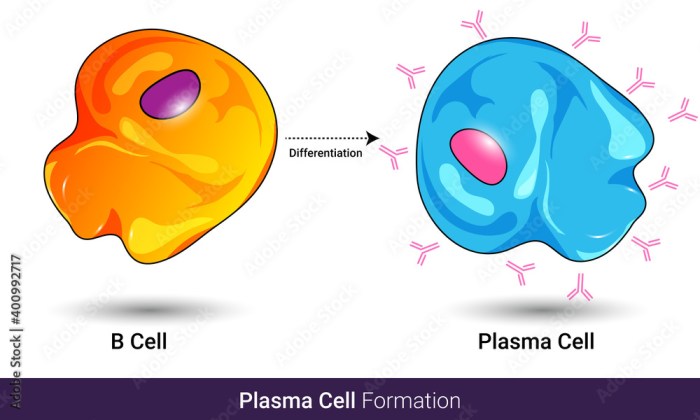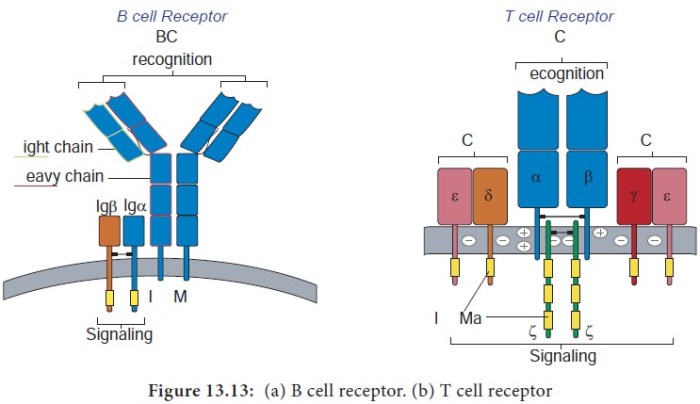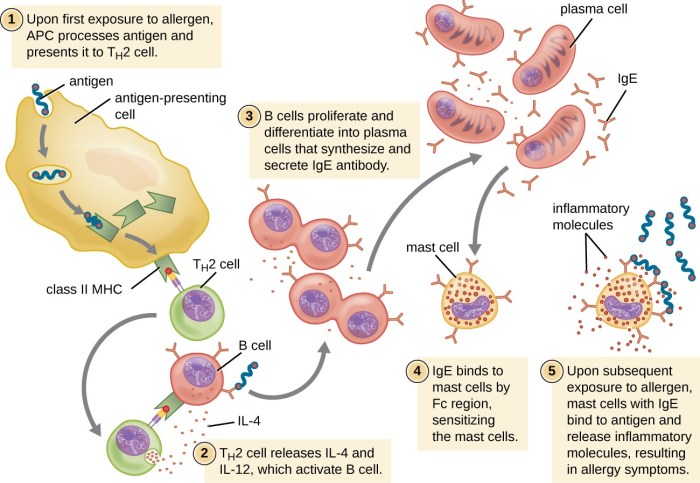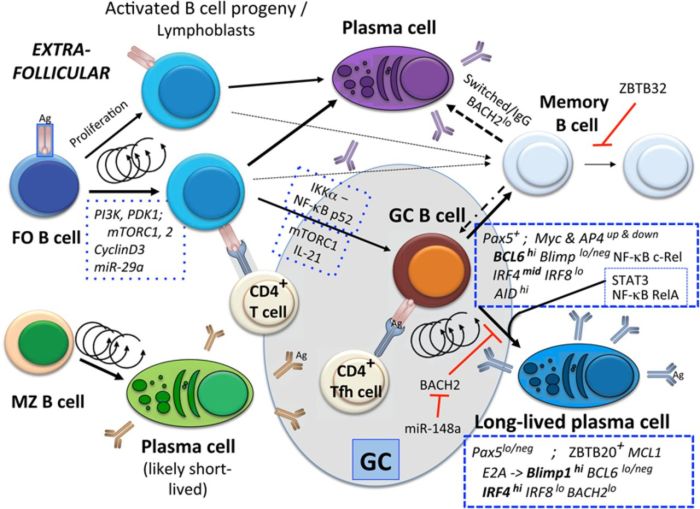B cells respond to the initial antigen challenge by ________. – B cells, crucial components of the adaptive immune system, play a central role in recognizing and responding to foreign antigens. Upon encountering an initial antigen challenge, B cells undergo a series of critical processes, including proliferation and differentiation, to mount an effective immune response.
This article delves into the intricate mechanisms involved in B cell activation, differentiation, and regulation, providing a comprehensive understanding of their essential role in combating infections and maintaining immune homeostasis.
B cells, upon encountering antigens presented by antigen-presenting cells, undergo clonal expansion, proliferating rapidly to generate a large population of antigen-specific B cells. This proliferative burst ensures an adequate supply of B cells capable of recognizing and neutralizing the invading pathogen.
B Cell Responses to Antigens: B Cells Respond To The Initial Antigen Challenge By ________.

B cells are a type of white blood cell that plays a critical role in the adaptive immune system. They are responsible for recognizing and responding to specific antigens, which are foreign molecules that can trigger an immune response. When B cells encounter an antigen, they undergo a series of activation and differentiation steps that lead to the production of antibodies, which are proteins that can neutralize or destroy the antigen.
Antigen Presentation
The first step in B cell activation is antigen presentation. Antigens are presented to B cells by antigen-presenting cells (APCs), which are specialized cells that capture and process antigens. The most common type of APC is the dendritic cell, which is found in tissues throughout the body.
Dendritic cells capture antigens by phagocytosis, the process of engulfing foreign particles. Once the antigen is captured, it is processed into smaller fragments and presented on the surface of the APC in association with MHC class II molecules.
B cells recognize antigens presented on APCs through their B cell receptors (BCRs). The BCR is a membrane-bound antibody that is specific for a particular antigen. When the BCR binds to its cognate antigen, it triggers a signaling cascade that leads to B cell activation.
B Cell Activation, B cells respond to the initial antigen challenge by ________.
B cell activation is a complex process that involves multiple signaling pathways. The main signaling pathway involved in B cell activation is the BCR signaling pathway. This pathway is initiated when the BCR binds to its cognate antigen. The binding of antigen to the BCR triggers the phosphorylation of the cytoplasmic tails of the BCR subunits, which leads to the activation of several downstream signaling molecules.
These signaling molecules include the tyrosine kinases Syk and Lyn, which activate the transcription factors NF-κB and AP-1. NF-κB and AP-1 are responsible for inducing the expression of genes that are required for B cell activation, such as the genes for cytokines and chemokines.
In addition to the BCR signaling pathway, B cell activation also requires co-stimulatory signals. Co-stimulatory signals are provided by molecules on the surface of APCs, such as CD80 and CD86. These molecules bind to receptors on the surface of B cells, such as CD28, and provide the second signal that is required for B cell activation.
B cell activation occurs in a series of stages. The first stage is the induction stage, during which the B cell is activated and begins to proliferate. The second stage is the clonal expansion stage, during which the activated B cell undergoes rapid cell division, producing a large number of identical daughter cells.
The third stage is the differentiation stage, during which the daughter cells differentiate into antibody-producing plasma cells or memory B cells.
B Cell Differentiation
Once B cells are activated, they differentiate into antibody-producing plasma cells or memory B cells. Plasma cells are short-lived cells that produce large amounts of antibodies. Memory B cells are long-lived cells that provide long-term immunity to a specific antigen.
Memory B cells are activated when they encounter the same antigen again, and they produce a rapid and robust antibody response.
The type of antibody that is produced by a B cell depends on the class of the B cell. There are five classes of B cells: IgM, IgG, IgA, IgD, and IgE. Each class of B cell produces a different type of antibody that has a different function.
IgM antibodies are the first antibodies that are produced in response to an antigen. IgG antibodies are the most common type of antibody in the blood. IgA antibodies are found in saliva, tears, and breast milk. IgD antibodies are found on the surface of B cells.
IgE antibodies are involved in allergic reactions.
Regulation of B Cell Responses
B cell responses are tightly regulated to prevent excessive or inappropriate immune responses. There are several mechanisms that are involved in regulating B cell responses. One mechanism is the production of regulatory cytokines, such as IL-10 and TGF-β. These cytokines suppress the activation and proliferation of B cells.
Another mechanism that is involved in regulating B cell responses is the induction of anergy. Anergy is a state of unresponsiveness that can be induced in B cells by exposure to high levels of antigen or by the absence of co-stimulatory signals.
Anergic B cells are unable to respond to antigens, and they eventually die.
Regulatory T cells (Tregs) also play a role in regulating B cell responses. Tregs are a type of T cell that suppresses the immune response. Tregs can inhibit the activation and proliferation of B cells, and they can also induce anergy in B cells.
FAQ Resource
What is the role of B cells in the immune system?
B cells are responsible for recognizing and responding to foreign antigens, producing antibodies that neutralize pathogens and activate other immune cells.
How do B cells proliferate in response to an antigen challenge?
Upon encountering an antigen presented by antigen-presenting cells, B cells undergo clonal expansion, rapidly dividing to generate a large population of antigen-specific B cells.
What is the role of differentiation in B cell response?
Differentiation allows B cells to mature into antibody-producing plasma cells, which secrete large amounts of antibodies specific to the antigen that triggered their activation.


